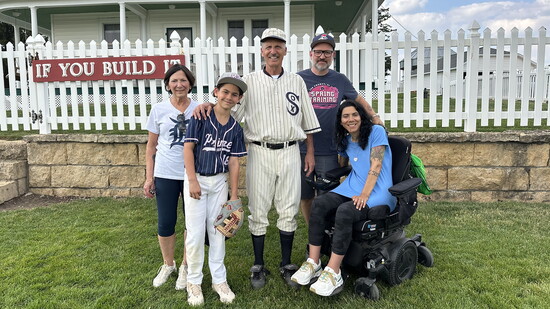In 2001, a car accident left Erica Coulston with a spinal cord injury, and at 23, she found herself paralyzed from the mid-chest down, with limited use of her hands and arms.
“It basically took away the majority of my independence, especially initially. That was a really difficult thing to process as a young adult,” recalls the Bloomfield Hills resident.
Although her doctors and therapists offered little hope for significant recovery beyond the first 18 months, Coulston refused to accept those limitations. Instead of letting her injury define her, she turned it into a mission. In 2007, she, her husband, and her parents launched Walk The Line Recovery Therapy (wtlrecovery.com). This Southfield-based rehabilitation center helps those with neurological diagnoses such as spinal cord injuries (SCI), brain injuries and multiple sclerosis work toward reclaiming independence and hope.
“After my accident, I was looking for providers who were willing to see the possibilities in me, instead of the limitations, because it was really easy for me to see my own limitations,” she says. “What I really needed was somebody to see the possible and what I could potentially be able to do, or what I could work toward.”
Her search for options took her across the country and around the world, seeking the latest innovations and treatments that could help her “get even just a little bit better.” Drawing on the knowledge she collected, Coulston brought these lessons home and started Walk The Line.
“We wanted to be a place of hope, community and recovery for people with significant neurological impairments or catastrophic injuries to have a place where they feel seen and heard and their opinion and goals are important,” Coulston says.
Staying true to that vision, Coulston is always on the lookout for groundbreaking treatments. Recently, her clinic became the first in Michigan to offer the ARC-EX System, the world’s first FDA-approved device shown to improve hand strength and sensation in people with chronic SCI. Poised to revolutionize rehabilitation, the system helps patients regain hand strength and sensation by stimulating the spinal cord through electrodes placed on the back of the neck. With support from the Christopher & Dana Reeve Foundation, among others, and named a Time magazine Best Invention of 2024, ARC-EX is considered to be the first tangible breakthrough in decades, providing the first non-invasive spinal-cord stimulation technology for the chronic SCI.
Not only is she offering the treatment to others, but she's also using it herself. Within the first two weeks of use, she experienced a significant breakthrough, noting improvement in her hand function and sensation, particularly the ability to almost make a full fist with her left hand, and progress with her picking up objects and writing.
“This is the first time I've seen something that is truly focused on actual recovery — not just adaptation, but change,” she says.
Last month marked 24 years since Coulston's car accident. Before her injury, she did advocacy work for a political nonprofit organization while trying to figure out the rest of her life. She wasn't sure whether she wanted to be a lawyer or a teacher.
Coulston remains deeply committed to advocacy work. She focuses on disability rights and accessibility and has worked to preserve and improve Michigan's no-fault insurance, as well as to make communities more accessible. She serves on the Michigan Statewide Independent Living Council and has been involved in various initiatives in Oakland County, establishing accessibility projects for small businesses, historic buildings and Main Street communities.
“I’ve always been very advocacy-minded, and I’ve always wanted to help people,” she says. “I'm not really sure where that would have taken me before, but this seems like a great mixture of everything I ever wanted.”
“With determination you create opportunity where others see misfortune.” — Erica Coulston
